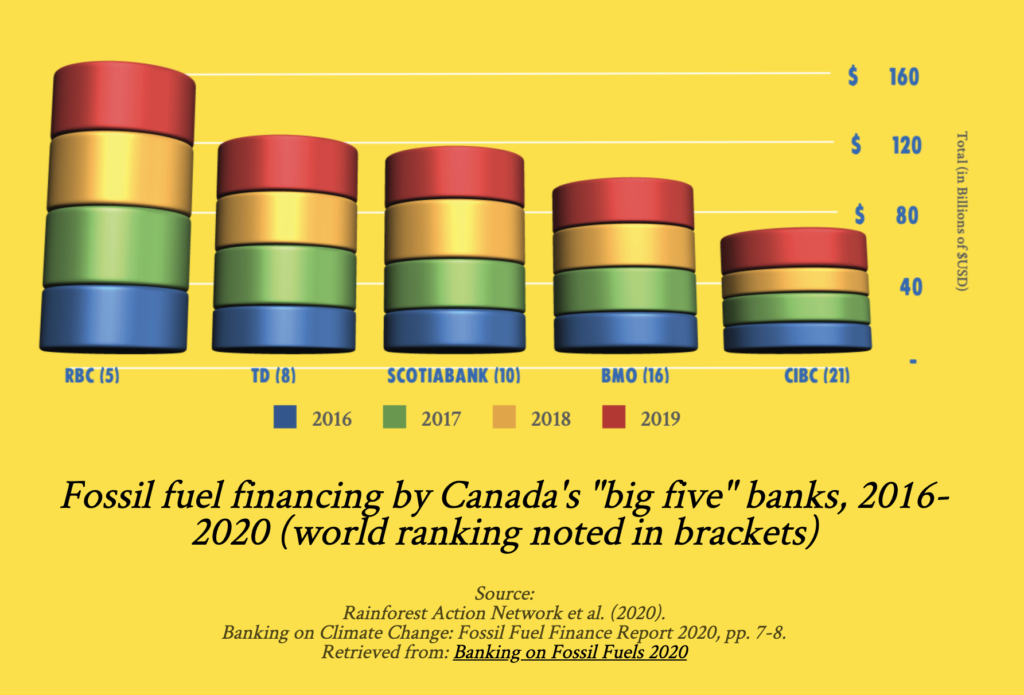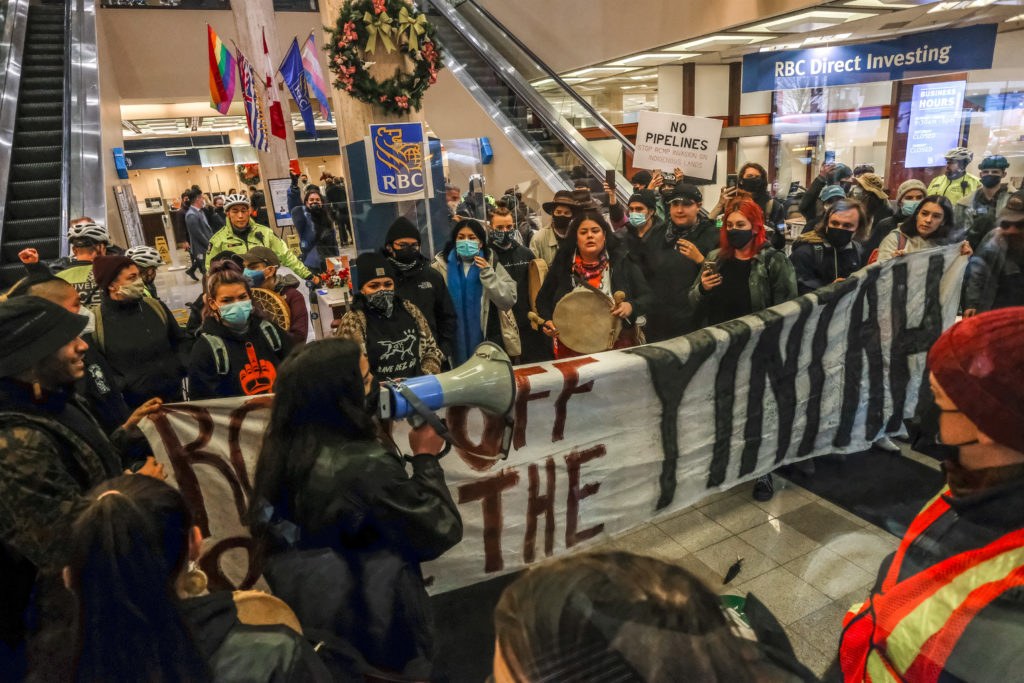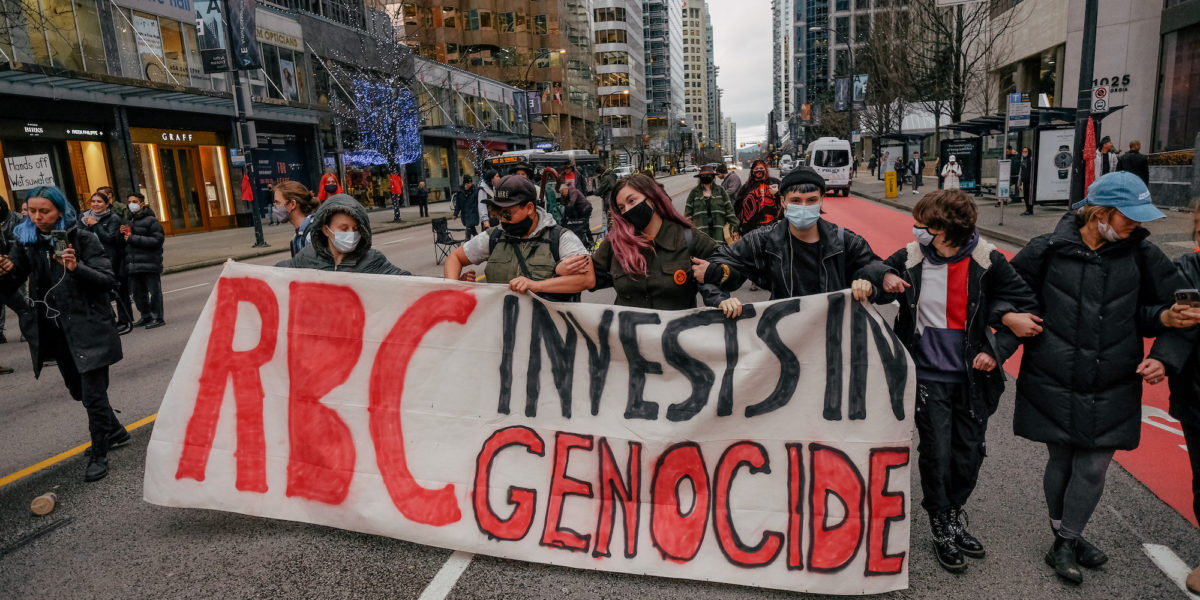“Why are you closing your account?” the Royal Bank of Canada teller asks me through the plexiglass.
“Why? An atmospheric river just wiped out the Coquihalla Highway. The last ice shelf in the Arctic has melted. Lytton! Lytton burst into flames and burnt to the ground in minutes this summer. We’re barrelling towards human extinction and I no longer want to be complicit.”
The teller stares back at me, lips parted, eyebrows raised.
“I’m not willing to stand idly by as Indigenous rights are violated over and over again. Did you know that RBC is one of the top funders of the Coastal Gaslink pipeline, the dirty energy project currently being pushed illegally through sacred Wet’suwet’en land?”
“Oh. Um…” Behind the plexiglass the teller clears their throat.
“No? Okay, listen.” I take a deep breath and exhale sharply. “I’m closing my bank account because RBC is accountable for these disasters and for the ongoing genocide of Indigenous peoples. Since 2016 your company has lent over $160 billion to fossil fuel projects. Projects that expedite global warming. Projects that are directly correlated with Missing and Murdered Indigenous Women, Girls, and Two-Spirit People.”
“Right,” the teller replies. They let out a nervous laugh and squint at the form on their computer. “I’m not sure what to fill in here. No one’s given me this reason for closing their bank account before.”
“Really?” I respond.
They nod.
“Huh.”
It’s been over a year since I left RBC (I embellished the above dialogue to include current events, but the gist of the conversation is the same) and it still blows me away that I was this teller’s first climate closure. Sometimes I forget that I can live in a bit of an echo chamber. While quitting fossil-fuel-funding banks may be a popular topic of conversation in the circles I travel in, most people are at full capacity just trying to survive under capitalism and aren’t even aware that their bank is funding the climate crisis.
Even though the majority of the public is worried, if not terrified, about climate change, the majority of people still continue to fuel the fire — if you’ll pardon the too-close-for-comfort metaphor. Because it is Canadians’ money that banks like RBC, CIBC, Scotiabank, BMO and TD use as leverage to fund the oil, gas, and coal industries. That’s right: every dollar in your corporate-run bank account is leveraged for up to $10-15 dollars of new lending in climate-destabilizing projects like the Coastal Gaslink Pipeline. For the top five worst banks in Canada (once more with feeling: RBC, CIBC, Scotiabank, BMO and TD) that meant over $557 billion dollars of funding to fossil fuel projects between 2016 and 2020.

Switching to a credit union was a no brainer for me. Why would I continue to participate in this deadly economic system? Moving my money only required a little effort. I opened my new bank account first — I chose Vancity, the lowest-carbon bank in Canada — and then closed down my RBC account once everything was set in place. While there have been some minor inconveniences where I’ve had to take time to call into Vancity for troubleshooting support, I haven’t regretted the switch for one minute. My money is now leveraged for community initiatives and green energy projects, not pipelines.
It may be easier for someone like me, a person without a mortgage or a line of credit, to leave their bank, but the switch is possible for everyone with a little time and effort. The first time I spoke with my parents about leaving RBC, they told me it would be too difficult to move to a credit union, but they have since changed their tune. Whether it was the heat dome or the proliferation of “Land Back” spray-painted around their town and my subsequent explanation of what that means, they’ve decided that they will close their RBC accounts, too.
While my folks understand their personal responsibility, many of their generation remain set in their ways. RBC CEO Dave McKay in particular has been embarrassingly daft when it comes to criticism. After being confronted by a group of youth protesting the Coastal Gaslink pipeline, McKay told Queen’s University Journal that “he’s ‘disappointed’ in Canadians protesting against the pipeline because he feels they’re uninformed on the issue,” further stating that CGL “has prior informed consent and approval under Canadian law.”
Now I don’t expect a man so entrenched in state power to understand that decisions made by the Indian Act Chief and Council are not real consent (though I hope he will grow up and learn someday soon), I do expect him to understand the climate science that tells us we cannot afford to burn the amount of oil that the CGL pipeline is slated to carry. I do expect him to be pragmatic in the face of climate urgency and invest Canadians’ money in the future, not the past. But since he and his corporation, the Royal Bank of Canada, have not demonstrated this understanding, we need to be the pragmatic ones. We must divest from RBC, as we must divest from all fossil fuels.

“Do you talk to your co-workers about RBC’s fossil fuel investments?” I ask my teller. “You could organize. Plan a walk out or strike. Demand change from the inside.”
They look at me with a pained sort of expression, cough, and keep typing.
“We all have a responsibility, you know,” I offer gently. “Each one of us plays a role in the destruction of the planet.”
I understand that pointing out individual responsibility can be a controversial take. When we know that the richest 10 percent of people do the majority of the damage to the planet and that 100 companies are responsible for 71 per cent of carbon emissions, it seems ludicrous to place any responsibility on one employee or individual — and that we should only focus on demanding that those who hold the most power change. But considering how many millions of people let their money passively fund their own demise; I think it’s time we start taking our individual power more seriously.
Our damaging economic system is made up of individuals and each one of us participates, whether we like it or not. Systemic change can only ever happen when enough of us decide to exercise our individual power. Individual change is the only thing we have complete control over. It’s time for everyone to take power into their own hands. We are the system and we don’t know what kind of shifts are truly possible when we all make the effort to change our own lives. Imagine what RBC would do if its clients began a mass exodus in real time or if thousands of people showed up to every Wet’suwet’en solidarity action at an RBC branch? How much faster would things change?
There’s absolutely no reason to continue letting the big banks use our savings to bulldoze through Indigenous rights and fund the destruction of the planet. Even if there isn’t enough money in your account to make a measurable difference in fossil fuel project investments, closing your account sends a message and creates a ripple effect, both inspiring others to do the same and empowering you to take on more tangible actions in your day-to-day life.
While the decision makers at RBC might not care about one individual leaving, they will care if thousands follow suit. Their caring will always be commensurate with their bottom line. The same goes for the rest of the big banks (here and everywhere; if you don’t bank in Canada, check out a list of the worst offenders globally). If enough of us commit to change, it will lead to real systemic change.
“Alright. Your account is closed.” The teller slides a piece of paper under the plexiglass. “You just need to sign here.”
“Thank you.” I pick up a pen and sign. “I hope I haven’t been too harsh. I value your work and I know you don’t make the financing decisions. I just hope you understand how urgent the situation is and know that you have the power to do something about it.”
They nod and give me a little shrug. Maybe I got through or maybe they already knew, but I said my piece and that’s all I can do. Taking responsibility for our lives — and our collective future — requires time, energy, and effort. Expecting this energy transition to be someone else’s responsibility is to continue participating in the ideology that got us into this trouble in the first place. Individuals uphold the system; we are the only ones capable of systemic change. The time to take action is now. As the Royal Bank of Canada states in its Community and Social Impact declaration:
“There has never been a greater need for extraordinary leadership to maximize the opportunities and mitigate the risks we face in our communities, and across the planet.”
I’m taking on that leadership role, and I encourage you to do so, too. It means doing everything within my individual power and not waiting for others to make the change.
Be careful with your marketing, greenwashed corporations, you just might inspire others to do the same.



